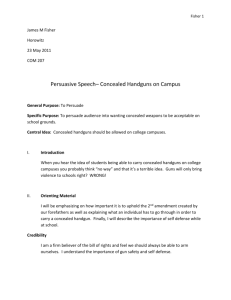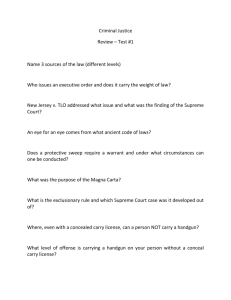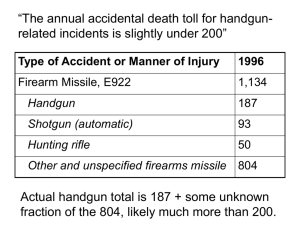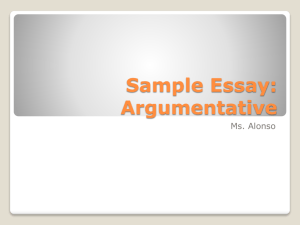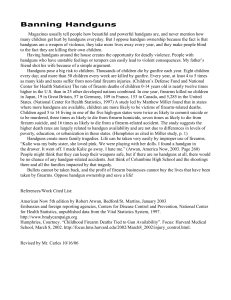HOUSE HB 910 RESEARCH
advertisement
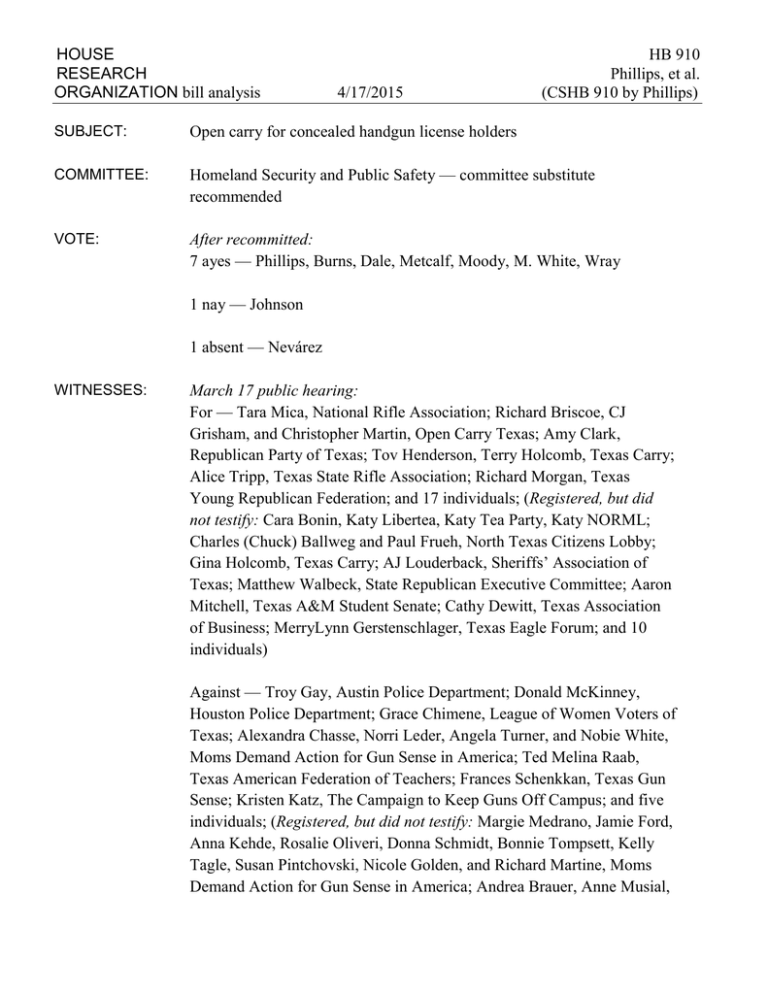
HOUSE RESEARCH ORGANIZATION bill analysis 4/17/2015 HB 910 Phillips, et al. (CSHB 910 by Phillips) SUBJECT: Open carry for concealed handgun license holders COMMITTEE: Homeland Security and Public Safety — committee substitute recommended VOTE: After recommitted: 7 ayes — Phillips, Burns, Dale, Metcalf, Moody, M. White, Wray 1 nay — Johnson 1 absent — Nevárez WITNESSES: March 17 public hearing: For — Tara Mica, National Rifle Association; Richard Briscoe, CJ Grisham, and Christopher Martin, Open Carry Texas; Amy Clark, Republican Party of Texas; Tov Henderson, Terry Holcomb, Texas Carry; Alice Tripp, Texas State Rifle Association; Richard Morgan, Texas Young Republican Federation; and 17 individuals; (Registered, but did not testify: Cara Bonin, Katy Libertea, Katy Tea Party, Katy NORML; Charles (Chuck) Ballweg and Paul Frueh, North Texas Citizens Lobby; Gina Holcomb, Texas Carry; AJ Louderback, Sheriffs’ Association of Texas; Matthew Walbeck, State Republican Executive Committee; Aaron Mitchell, Texas A&M Student Senate; Cathy Dewitt, Texas Association of Business; MerryLynn Gerstenschlager, Texas Eagle Forum; and 10 individuals) Against — Troy Gay, Austin Police Department; Donald McKinney, Houston Police Department; Grace Chimene, League of Women Voters of Texas; Alexandra Chasse, Norri Leder, Angela Turner, and Nobie White, Moms Demand Action for Gun Sense in America; Ted Melina Raab, Texas American Federation of Teachers; Frances Schenkkan, Texas Gun Sense; Kristen Katz, The Campaign to Keep Guns Off Campus; and five individuals; (Registered, but did not testify: Margie Medrano, Jamie Ford, Anna Kehde, Rosalie Oliveri, Donna Schmidt, Bonnie Tompsett, Kelly Tagle, Susan Pintchovski, Nicole Golden, and Richard Martine, Moms Demand Action for Gun Sense in America; Andrea Brauer, Anne Musial, HB 910 House Research Organization page 2 Jonathan Panzer, and Kimberly Taylor, Texas Gun Sense; and eight individuals) On — Pablo Frias, “We The People”; Justin Delosh, Lone Star Gun Rights; William Brown, Republic of Texas TV; Jeremy Blosser, Tarrant County Republican Party; Rachel Malone, Texas Firearms Freedom; Jacob Cordova; and five individuals; (Registered, but did not testify: Sherrie Zgabay, Texas Department of Public Safety; Joshua Houston, Texas Impact; Wade Olson) BACKGROUND: Government Code, ch. 411, subch. H establishes the eligibility requirements for concealed handgun licenses. The requirements include: being a legal resident of Texas or otherwise eligible for a nonresident license; being at least 21 years old unless the person is an honorably discharged member of the military who meets all other requirements; generally not having been convicted of or charged with criminal activity; being capable of exercising sound judgment for handgun use and storage and passing a mental health check; submitting fingerprints, paying a license fee, and passing a criminal history background check; and showing evidence of handgun use proficiency. DIGEST: Concealed carry to open carry. CSHB 910 would expand the scope of a concealed handgun license to authorize an individual possessing the license to carry a handgun, whether or not it was concealed. The license holder would be entitled to carry a handgun in plain view in a public place if the handgun was carried in a shoulder or belt holster. It also would make most statutory provisions that regulate concealed handgun license holders and carrying a concealed handgun apply to carrying a handgun, whether or not it was concealed. Conforming changes would amend the Alcoholic Beverage Code, Government Code, Penal HB 910 House Research Organization page 3 Code, Code of Criminal Procedure, Education Code, Election Code, Family Code, Health and Safety Code, Labor Code, Local Government Code, Occupations Code, and Parks and Wildlife Code. Trespass by license holder. The bill would add Penal Code, sec. 30.07 to establish a new offense that would parallel the current offense of trespass by a concealed handgun license holder (Penal Code, sec. 30.06). The new offense would cover trespassing with an openly carried handgun if a license holder entered another’s property without effective consent and: had notice that the entry was forbidden; or received notice that remaining on the property was forbidden and failed to depart. A license holder would receive notice if an owner or someone with apparent authority to act on the owner’s behalf provided notice by oral or written communication. A written communication would be defined as a card or document with language required by Penal Code, sec. 30.07 or a sign posted on the property. The sign would be required to: include Penal Code, sec. 30.07 language in both English and Spanish; have contrasting colors with block letters at least one inch in height; and be conspicuously displayed and clearly visible at each entrance to the property. The bill also would create an exception to the trespass offense if the property was owned or leased by a governmental entity and was not a place where license holders were prohibited from carrying guns. The bill would not allow a defense to prosecution for carrying the handgun in a shoulder or belt holster. An offense under this section would be a class A misdemeanor (up to one year in jail and/or a maximum fine of $4,000). HB 910 House Research Organization page 4 Unlawful carrying by a license holder. The bill would prohibit a licensed holder from openly carrying and intentionally displaying a handgun on the premises of an institution of higher education, including any public or private driveway, street, sidewalk or walkway, or parking area. Such offense would be a class A misdemeanor. It would be a defense to prosecution if the actor brought the handgun in plain view under circumstances in which the actor would have been justified in the use of force or deadly force. The bill would extend to open carry the current law on places where license holders cannot carry handguns. Criminal trespass. The bill would extend the defense to prosecution for the current criminal trespass offense that deals with concealed carry to include open carry. Personal protection officers. The bill would specify that an individual acting as a personal protection officer who was not wearing a security officer’s uniform would have to conceal any firearm the protection officer was carrying, regardless of whether the person was authorized to openly carry the firearm under any other law. Unlawful carrying of weapons. The bill would permit the carrying of handguns in plain view in a motor vehicle or watercraft owned by the person if the person was licensed to carry a handgun and the handgun was carried in a shoulder or belt holster. License instruction. The bill would require instructors to include instruction on the use of restraint holsters and methods of securely carrying a handgun openly in the handgun proficiency course that is required to receive a license to carry a handgun. Repealing concealed handgun definition. The bill would repeal Government Code, sec. 411.171(3), which defines a concealed handgun. Application. The changes in the bill would apply to the carrying of a HB 910 House Research Organization page 5 handgun on or after the effective date of the bill by any person who holds a license to carry a concealed handgun or any person who applies for a license, regardless of whether the license was issued or the application was made before, on, or after the effective date of the bill. The penalties created in the bill would apply only to an offense committed on or after the effective date of the bill. Conforming changes to language in Local Government Code, sec. 118.011(b) regarding a county fee for a mental health background check required for a license to carry would take effect September 1, 2015. Otherwise, the bill would take effect January 1, 2016. SUPPORTERS SAY: CSHB 910 would protect law-abiding Texans’ Second Amendment rights under the U.S. Constitution by allowing them to openly carry handguns. Texas’ prohibition on open carry, even for individuals who have received training and are licensed to carry concealed handguns, is an unreasonable restriction of those constitutional rights. This bill simply would extend existing requirements for licensed concealed carry of handguns to open carrying. Forty-four U.S. states already allow open carry of handguns, and this bill would bring Texas in line with the majority of the country. Many of the same safety concerns raised about open carry also were raised about concealed carry before it was enacted in Texas in 1995, and those worries have proved unfounded, as have concerns about open carry in other states. Allowing licensed individuals to openly carry handguns under the bill would not pose a danger to the community. The background check and licensing process to obtain a handgun license is extremely thorough and prevents people who have committed serious crimes from acquiring licenses. Moreover, concealed handgun license holders are much less likely than civilians who do not hold the license to commit a crime. The Texas Department of Public Safety reported in 2013 that less than half of 1 percent of total criminal convictions were of concealed handgun license holders. If a handgun license holder who was openly carrying did commit HB 910 House Research Organization page 6 a crime, existing laws would be enforced against that individual, as this bill would not change those laws. Far from creating a public safety risk, this bill might in fact help reduce criminal activity. Crime rates have dropped significantly since the establishment of the concealed handgun licensing system in Texas, and other states also have seen a drop in crime after enacting similar licensing laws. After a handgun licensing system was instituted in Illinois, the crime rate dropped to its lowest rate in more than 50 years. Oklahoma instituted open carry laws in 2012, and in 2013 the state showed a drop in overall crime, a 7.3 percent drop in violent crimes, and a significant drop in the number of murders committed. The presence of well trained civilians visibly carrying handguns on their person could provide a valuable deterrent to would-be criminals. By openly carrying a weapon, civilians who found themselves targeted by criminals would have faster, easier access to their weapons to defend themselves than would a person with a concealed handgun. In addition, the bill’s requirements that a person use a shoulder or belt holster would help ensure that the handgun was secured to the person’s body. While police officers might receive some emergency calls involving people openly carrying handguns, other states with open carry have not found the number of these calls to be overly burdensome on law enforcement. In practice, most licensed handgun owners in other states have preferred to keep their weapons concealed, which likely would be the case in Texas as well. Because a majority of people would not carry openly, there would not be an increased burden on officers to check licenses of those openly carrying. The bill would not infringe on personal property rights because individuals and businesses still would have the right to prohibit handguns on their property by posting the proper notice. The requirement to display more than one sign would not be overly burdensome for business owners. The bill would not remove a licensed individual’s right to carry a HB 910 House Research Organization page 7 concealed handgun nor allow a larger number of people to be able to carry guns, but merely would give license holders an option to open carry. Any individual who wanted to openly carry a handgun under the bill still would need to fulfill all requirements to obtain a license to carry a handgun, which would ensure that the individual was properly trained. This bill would not change the way reciprocity is granted. The governor and attorney general still would be required to make a finding that another state’s laws met the eligibility requirements of Texas statutes for carrying a handgun. OPPONENTS SAY: The changes proposed in CSHB 910 are unnecessary and inappropriate because nothing is wrong with the current concealed handgun system in Texas, and the bill would not address any real safety concerns. In a February 2015 survey conducted by the University of Texas at Austin and the Texas Tribune, only 22 percent of respondents believed Texans with handgun licenses should be allowed to open carry. There is no evidence open carry would deter crime or reduce violence, and openly carrying handguns could create an environment of fear, intimidation, and unnecessary provocation. Although many states have open carry laws, the states that do not are some of the largest, including California, Florida, and New York. Additionally, many states’ open carry laws have more stringent requirements than would be enacted through this bill. For example, North Dakota requires openly carried guns to be unloaded. There is no evidence that open carry has been the cause of reduced crime rates in other states. In fact, individuals who openly carry their weapons could be at greater risk of being harmed by their own guns due to theft. Highly trained police officers who openly carry handguns have lost their lives after being attacked with their own guns by criminals. The bill also would place additional burdens on police officers. In a February 2015 survey of 192 police chiefs conducted by the Texas Police Chiefs Association, about 74 percent opposed open carry. When police officers respond to an emergency call involving handguns, the presence of HB 910 House Research Organization page 8 many people carrying openly could cause confusion and divert police attention away from the criminals. Police officers might not immediately be able to distinguish the law-abiding civilians from the criminals in an emergency, which could lead to a greater risk of harming innocent people. Law enforcement personnel responding to emergency calls also might have to spend valuable time and manpower checking the licenses of people who were openly carrying handguns. Private property owners should have the right to make decisions about whether to allow open carrying of handguns on their property without being burdened by additional requirements. The bill would make notice requirements onerous by requiring a business to display separate signs prohibiting concealed and openly carried weapons. This especially would impact smaller businesses. CSHB 910 would not include enough requirements for new training and education for handgun license holders. Currently licensed individuals suddenly would have many new rights under the bill, and they would need additional training on the new information. According to the survey of police chiefs in February, about 76 percent believed that a person carrying a handgun should receive retention training. The bill could allow individuals from other states to openly carry handguns in Texas under a separate reciprocity agreement. Many other states do not have the same strict licensing requirements the state of Texas mandates, and no additional training for the nonresidents would be required under the bill. At the very least, the bill should be amended to restrict open carry to rural areas only. Open carry in rural areas would pose less of a threat to public safety, while open carrying of handguns in highly populated urban areas could cause unnecessary alarm and confusion in chaotic situations. OTHER OPPONENTS SAY: CSHB 910 would not go far enough in protecting the freedom of Texans to openly carry a weapon as they chose. Individuals with licenses to carry handguns should be able to choose whether to carry their gun in a holster. HB 910 House Research Organization page 9 Holsters can be costly, and the bill should not require that they be used. This bill inappropriately would restrict the rights Texans have under the U.S. Constitution to carry handguns. The requirements of obtaining a license and taking a class to be able to openly carry a handgun would infringe upon the Second Amendment right to bear arms. Individuals should not have to obtain a license as required by the bill to carry a handgun. Thirty-one states already allow open carrying of handguns without a permit. NOTES: CSHB 910 differs from the original bill in that it would: add requirements to the Government Code for additional instruction by qualified handgun instructors on use of restraint holsters and methods to ensure safe open carrying; add a class A misdemeanor offense for a person openly carrying and intentionally displaying a handgun in plain view on the premises of an institution of higher education, or on a driveway, street, sidewalk, or parking area of an institution of higher education; preserve and extend a defense to prosecution when the use of deadly force is justified; preserve the exemption provided under current law on openly carrying a handgun for certain historical reenactments; add a reference to definitions for an institution of higher education and private or independent institution of higher education; and extend the general effective date to January 1, 2016. Unlike HB 910 as introduced, the committee substitute removed language that would have changed current law to require a school district’s board of trustees to adopt regulations allowing a school marshal to openly carry a handgun. A companion bill, SB 17 by Estes, was approved by the Senate on March 17. Another companion, SB 346 by Estes, was referred to the Senate State Affairs Committee on February 2. HB 910 House Research Organization page 10 CSHB 910 was reported favorably by the House Committee on Homeland Security and Public Safety on March 26, placed on the General State Calendar for April 14, recommitted on a point of order and again reported favorably on April 14.

